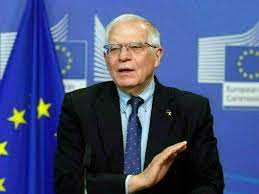EU calls for ‘humanitarian pause’

Brussels: The European Union edged on Monday towards endorsing a “humanitarian pause” in the Israeli aggression against Gaza, while some member governments signalled reservations about the idea.
Josep Borrell, the EU’s foreign policy chief, said he backed a call by UN Secretary-General Antonio Guterres for a break in the Israeli bombarding on Gaza to allow much more humanitarian aid to reach Palestinian civilians.
EU officials also drafted a statement in support of the proposal for an EU summit later this week, although they cautioned the text could still change in the coming days. The moves reflected increasing alarm about the fate of Palestinian civilians after two weeks of Israel bombarding and blockading Gaza.
“Now the most important thing is for humanitarian support to go into Gaza,” Borrell told reporters on arrival at a meeting of EU foreign ministers in Luxembourg. EU members including France, Spain, the Netherlands, Ireland, Slovenia, and Luxembourg have also backed the idea.
“There’s a vital need to get water, to get food, to get medical supplies into Gaza,” said Irish Foreign Minister Micheal Martin. “The degree of human suffering is immense.” But some other ministers openly expressed reservations about the proposal or avoided a direct answer when asked about it.
The divergence in views broadly reflected longstanding differences within the EU over the Israeli-Palestinian crisis, with those seen as more sympathetic to Palestinians pushing for a pause while staunch allies of Israel were more reluctant.
With proposals and a push for a humanitarian truce, French President Emmanuel Macron flies to Israel on Tuesday, despite a looming ground offensive into Gaza.
His advisers said that beyond showing solidarity with Israel, Macron wanted to make “proposals that are as operational as possible” to prevent an escalation, free prisoners, guarantee Israel’s security, and work towards a two-state solution.
The French leader upped the ante before the trip, telling reporters he would only travel to the region if he thought the visit would be “useful”.
Declining to elaborate on what these proposals could be, a Macron adviser only said in a briefing to reporters there were things that could be done so that “Israel doesn’t feel alone in its fight against terrorism.”
Macron will meet with Israeli Prime Minister Benjamin Netanyahu, Israeli President Isaac Herzog, and centrist leaders Benny Gantz and Yair Lapid for the opposition. Also, a meeting with Palestinian leader Mahmoud Abbas was “most likely” as well as a stop-over in one or more Arab capitals in the region, French officials said.
Meanwhile, Russian, Iran, and Turkiye foreign ministers, along with those of Armenia and Azerbaijan, “exchanged views on the situation in Gaza” and “emphasised the need for immediate termination of targeting innocent civilians” during a meeting in Tehran, a joint statement said on Monday.
In addition, Dutch Prime Minister Mark Rutte spoke with Palestinian Authority President Mahmud Abbas, Dutch press agency ANP reported on Monday.
Rutte also spoke of the importance of the prospect of an independent Palestinian state next to Israel, calling the two-state solution “the only way to bring stability to the entire region”, ANP said.
Speaking about the US deployment of warships to the region during a meeting in Tehran, Russian Foreign Minister Sergei Lavrov said “The more a state takes this kind of proactive measures, the greater the risk and the danger of an escalation of the conflict”.
“Russia does not accept any manifestation of terrorism, any manifestation of violence in violation of international humanitarian law, including the indiscriminate use of force,” he said.
China’s Middle East envoy was expected to arrive in the United Arab Emirates for a visit aimed at “cooling down the situation” in the Middle East.
Zhai Jun began his tour of the Middle East last week, first visiting Qatar and meeting with the Gulf nation’s foreign minister as well as his Russian counterpart on Thursday.
He will take part in a symposium on China-UAE relations, Beijing’s foreign ministry spokesperson Mao Ning said on Monday. She did not elaborate on his itinerary in the country. Zhai then “plans to continue to visit the Middle East to strengthen coordination with relevant parties on promoting a ceasefire, stopping the violence, and cooling down the situation,” Mao said.





